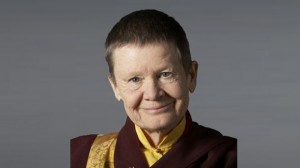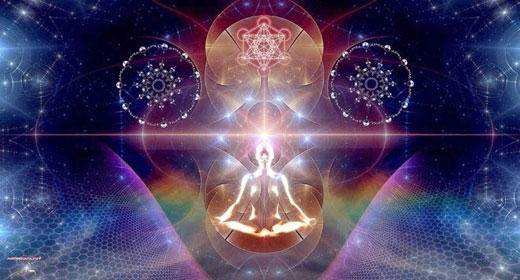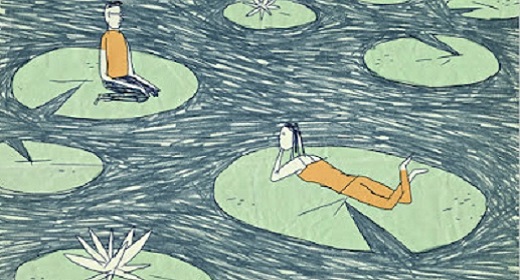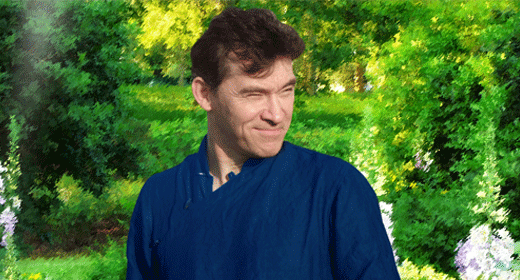PEMA CHÖDRÖN offers her unique perspective on The Way of the Bodhisattva, Shantideva’s classic description of the Mahayana path.  Here she addresses one of the most important of all spiritual questions—how to free ourselves from the powerful spell of the emotional afflictions.
Here she addresses one of the most important of all spiritual questions—how to free ourselves from the powerful spell of the emotional afflictions.
by Pema Chödrön: Rousing the bodhi heart means connecting with our longing for enlightenment, with the clear desire to alleviate the escalating suffering we see in the world today. Most people do not give much thought to enlightenment. But most of us do long for a better world situation, and we long to be free of neurotic habits and mental anguish. This is the ideal state of mind for awakening bodhicitta, the aspiration to achieve enlightenment for the sake of all sentient beings. We know we want to be part of making things better, and that we need to get saner to do this effectively. It’s the perfect place to start.
If we can commit to pursuing this goal, we’re on the same page as Shantideva. Like us, he had to work with a wild mind, overpowering emotions, and entrenched habitual patterns. Like us, he was able to use his life, just as it was, to work intelligently with his reactivity. The yearning to do this is “aspiration bodhicitta.” Although we may not always be able to stop ourselves from bringing pain to others, our intention to sort out our confusion and be of service remains unwavering.
In chapters 1–3 of The Way of the Bodhisattva, Shantideva shares his aspiration to make waking up and benefiting others his top priority. In the following three chapters, he provides methods for insuring that this bodhicitta passion doesn’t decline.
This is a very important topic. When we’re young, we have a natural curiosity about the world around us. There’s a natural spark that energizes us and motivates us to learn, as well as a fear of becoming like some of the older people we see: stuck in their ways, with closed minds and no spirit of adventure.
It’s true that as some people get older, they begin spending more time in pursuit of comfort and security. But Shantideva is passionately determined to keep his youthful curiosity alive. He aspires to continually stretch his heart beyond its current preconceptions and biases. Instead of staying stuck in his cocoon, he wants to grow in flexibility and enthusiasm.
The bodhisattva path is not about being a “good” person or accepting the status quo. It requires courage and a willingness to keep growing.
In chapter 4 of The Way of the Bodhisattva, Shantideva addresses two topics essential to keeping one’s passion alive. The first is attentiveness; the second is working skillfully with emotions. The title of this chapter in Tibetan is pag-yü, which has been translated many different ways. Here it is translated as “awareness”; elsewhere it is called “conscientiousness,” “ heedfulness,” and “carefulness.” I feel the most descriptive translation is “attentiveness”: paying attention with intelligent awareness of what’s happening. A traditional analogy is walking along the edge of a deep crevasse: we’re attentive and keenly aware of the consequences of carelessness.
Attentiveness is a significant component of self-reflection. By paying attention when we feel the tug of shenpa, we get smarter about not getting hooked. Shenpa is the Tibetan word for attachment. Dzigar Kongtrül describes it as the “charge” behind emotions: the charge behind “I like and don’t like,” the charge behind self-importance itself. Shenpa is the feeling of getting “hooked,” a nonverbal tightening or shutting down. Suppose you are talking to someone and suddenly you see her jaw clench; she stiffens or her eyes glaze over. What you’re seeing is shenpa: the outer manifestation of an inner tug, the subtlest form of aversion or attraction. We can see this in each other; more importantly we can feel this charge in ourselves.
In chapter 4, Shantideva gives five examples of when to apply attentiveness: when bodhicitta arises; before we make a commitment; after we’ve made a commitment; when relating with the cause and effect of karma, or consequences of our actions; and finally, when we are seduced by our kleshas.
The Sanskrit word klesha refers to a strong emotion that reliably leads to suffering. It’s sometimes translated as “neurosis” and, in this text, as “afflictions” and “defiled emotions.” In essence, kleshas are dynamic, ineffable energy, yet it’s energy that easily enslaves us and causes us to act and speak in unintelligent ways.
Kleshas arise with the subtle tension inherent in dualistic perception. If we don’t catch this tension, it sets off a chain reaction of “for” or “against.” These reactions quickly escalate, resulting in fullblown aggression, craving, ignorance, jealousy, envy, and pride—in other words, full-blown misery for ourselves and others. Kleshas survive on ignorance—ignorance of their insubstantial nature and the way we reinforce them—and they are fueled by thoughts. That their power can be diffused by attentiveness is the main theme of chapter 4.
4.26
For it’s as if by chance that I have gained
This state so hard to find, wherein to help myself.
And now, when freedom—power of choice—is mine,
If once again I’m led away to hell,
4.27
I am as if benumbed by sorcery,
My mind reduced to total impotence
With no perception of the madness overwhelming me.
O what is it that has me in its grip?
From moment to moment, we can choose how we relate to our emotions. This power of choice gives us freedom, and it would be crazy not to take advantage of it.
On the other hand, when habitual reactions are strong and long-standing, it’s difficult to choose intelligently. We don’t intentionally choose pain; we just do what’s familiar, which isn’t always the best idea. I think we can all relate with feeling benumbed by sorcery, reduced to total impotence, or overwhelmed by madness. But what actually has us in its grip? The answer is our kleshas: limbless and devoid of faculties—with, in essence, no substance or solidity at all!
4.28
Anger, lust—these enemies of mine—
Are limbless and devoid of faculties.
They have no bravery, no cleverness;
How then have they reduced me to such slavery?
This is the sixty-four-thousand-dollar question. How can this powerful but completely ungraspable, ineffable energy do us so much harm? In the following verses Shantideva begins to answer this question by presenting the five faults of the kleshas, the five problematic aspects of our confused emotions.
The first fault, presented in verse 28, is that we become enslaved by the kleshas. This insight alone would undercut their power, if we were attentive to it. But as Shantideva says, it’s as if we’re under a spell.
Emotional reactivity starts as a slight tightening. There’s the familiar tug of shenpa and before we know it, we’re pulled along. In just a few seconds, we go from being slightly miffed to completely out of control.
Nevertheless, we have the inherent wisdom and ability to halt this chain reaction early on. To the degree that we’re attentive, we can nip the addictive urge while it’s still manageable. Just as we’re about to step into the trap, we can at least pause and take some deep breaths before proceeding.
4.29
I it is who welcome them within my heart,
Allowing then to harm me at their pleasure!
I who suffer all without resentment—
Thus my abject patience, all displaced!
The second fault of the kleshas is that we welcome them. They’re familiar. They give us something to hold on to, and they set off a predictable chain reaction that we find irresistible. This insight can be especially helpful.
When we realize that we like our kleshas, we begin to understand why they have such power over us. Hatred, for example, can make us feel strong and in charge. Rage makes us feel even more powerful and invulnerable. Craving and wanting can feel soothing, romantic, and nostalgic: we weep over lost loves or unfulfilled dreams. It’s painfully and deliciously bittersweet. Therefore, we don’t even consider interrupting the flow. Ignorance is oddly comforting: we don’t have to do anything; we just lay back and don’t relate to what’s happening around us.
Each of us has our own personal way of welcoming and encouraging the kleshas. Being attentive to this is the first and crucial step. We can’t be naïve. If we like our kleshas, we will never be motivated to interrupt their seductiveness; we’ll always be too complacent and accommodating.
A good analogy for the kleshas is a drug pusher. When we want drugs, the pusher is our friend. We welcome him because our addiction is so strong. But when we want to get clean, we associate the pusher with misery, and he becomes someone to avoid. Shantideva’s advice is to treat our crippling emotions like drug pushers. If we don’t want to stay addicted for life, we have to see that our negative emotions weaken us and cause us harm.
It is just as difficult to detox from emotions as it is to recover from heavy drugs or alcohol. However, when we see that this addiction is clearly ruining our life, we become highly motivated. Even if we find ourselves saying, “I don’t want to give up my kleshas,” at least we’re being honest, and this stubborn declaration might begin to haunt us.
But I’ll tell you this about klesha addiction: without the intelligence to see that it harms us and the clear intention to turn it around, that familiar urge will be very hard to interrupt before it’s going strong.
Do not, however, underestimate the healing power of self-reflection. For example, when you’re about to say a mean word or indulge in self-righteousness or criticism, just reflect on the spot: “If I strengthen this habit, will it bring suffering or relief?”
Of course, you need to be completely honest with yourself and not blindly buy into what the Buddha and Shantideva have to say. Maybe your habits give you pleasure as well as pain; maybe you’ll conclude that they really don’t cause you to suffer, even though the teachings say they should. Based on your own personal experience and wisdom, you have to answer these questions for yourself.
Verses 30 and 31 say more about the futility of habitual responses to kleshas, and the danger of welcoming that which causes suffering.
4.30
If all the gods and demigods besides
Together came against me as my foes,
Their mighty strength—all this would not avail
To fling me in the fires of deepest hell.
4.31
And yet, the mighty fiend of my afflictions,
Flings me in an instant headlong down
To where the mighty lord of mountains
Would be burned, its very ashes all consumed.
Here he reflects that getting emotionally worked up has consequences so painful and intense they could reduce the mightiest of mountains to dust. But, again, the Buddhist teachings encourage us to reflect on our own experience to see if what’s being taught rings true.
In verse 32, we have the third fault of the kleshas: if we’re not attentive, the kleshas will continue harming us for a very long time.
4.32
No other enemy indeed
Has lived so long as my defiled emotions—
O my enemy, afflictive passion,
Endless and beginningless companion!
Long after those we despise have moved away or died, the hatred habit remains with us. The more we run our habitual patterns, the stronger they become—and, of course, the stronger they get, the more we run them. As this chain reaction becomes harder to interrupt, our experience of imprisonment becomes more intense until we feel hopelessly trapped with a monstrous companion. No outer foe will ever plague us as much as our own kleshas.
Verse 33 presents the fourth fault: give the kleshas an inch and they’ll take a mile.
4.33
All other foes that I appease and wait upon
Will show me favors, give me every aid,
But should I serve my dark defiled emotions,
They will only harm me, draw me down to grief.
Shantideva warns us not to be naïve about the pusher; we have to know his strategies and seductive ways. Likewise, we simply can’t afford to be ignorant about the power of emotions. We can neither welcome nor indulge them in hopes they’ll bring us happiness or security.
When the teachings tell us to “make friends with our emotions,” they mean to become more attentive and get to know them better. Being ignorant about emotions only makes matters worse; feeling guilty or ashamed of them does the same. Struggling against them is equally nonproductive. The only way to dissolve their power is with our wholehearted, intelligent attention.
Only then is it possible to stay steady, connect with the underlying energy, and discover their insubstantial nature. We can’t be stupid about this process. There’s no way to abide with our dynamic, ungraspable emotions if we keep fueling them with thoughts. It’s like trying to put out a fire with kerosene.
4.34
Therefore, if these long-lived, ancient enemies of mine,
The wellspring only of increasing woe,
Can find their lodging safe within my heart,
What joy or peace in this world can be found?
In verse 34, Shantideva presents the fifth and final problematic aspect of the kleshas: as long as we are enslaved by them, there will never be world peace. We will have no peace of mind personally, and the suffering of beings everywhere will continue unabated. War will continue; and violence, neglect, addiction, and greed will continue endlessly. By steadying ourselves before we’re taken over by our emotions, we create the causes of peace and joy for us all.
4.35
And if the jail guards of the prisons of samsara,
The butchers and tormentors of infernal realms,
All lurk within me in the web of craving,
What joy can ever be my destiny?
Typically we blame others for our misery. But Shantideva says we create our own infernal realms: our personal hells are interdependent with our klesha-ridden minds. In his view, we must take responsibility for what happens to us. If we give safe lodging to neurosis, then how can we expect it to result in joy?
Just before the Buddha attained enlightenment, his kleshas arose in full force. He was tempted by anger, desire, and all the rest; but unlike most of us, he didn’t take the bait. He is always pictured as wide awake: fully present—on the dot—relaxed and undistracted by the powerful energy of the kleshas.
In one of the Harry Potter books, the budding bodhisattva, Harry, is put under a curse that creates an extremely strong urge to give in to the kleshas and do harm. The power of Harry’s intelligence and kindness, however, is even stronger. He doesn’t believe the voices of the kleshas or get seduced by their promises of comfort, and so the curse doesn’t work.
4.36
I will not leave the fight until, before my eyes,
These enemies of mine are all destroyed.
For if, aroused to fury by the merest slight,
Incapable of sleep until the scores are settled,
4.37
Foolish rivals, both to suffer when they die,
Will draw the battle lines and do their best to win,
And careless of the pain of cut and thrust,
Will stand their ground, refusing to give way,
4.38
No need to say that I will not lose heart,
Regardless of the hardships of the fray.
These natural foes today I’ll strive to crush—
These enemies, the source of all my pain.
Because Shantideva was a prince in the warrior tradition, it’s natural for him to use images of war. His words, however, are not meant to convey aggression. The courage of the samsaric warrior is used as an analogy for the compassionate courage of the bodhisattva. We need bravery to nonaggressively stand our ground against the kleshas. With the weapons of clear determination, intelligent awareness, and compassion, we can short-circuit their seductiveness and power.
Of course, we may experience discomfort in the process, the same discomfort and restlessness we go through with any withdrawal. According to tradition, giving in to the lure of kleshas is easy in the beginning, but makes our lives increasingly more difficult in the end. In contrast, withdrawing from habitual responses is difficult in the beginning, but our lives become increasingly more relaxed and free in the end.
When we’re going through klesha withdrawal, it helps to know we’re on the right track. Shantideva remarks that—just as foolish rivals endure physical pain, sleeplessness, and even death—he will go through the anguish of detox to cease being a slave to his kleshas. He will not lose heart and give up because of pain or fear.
4.39
The wounds inflicted by the enemy in futile wars
Are flaunted by the soldier as a trophy.
So in the high endeavor for so great a prize,
Why should hurt and injury dismay me?
In the wars fought because of greed or hatred, soldiers proudly display their wounds: their injuries are like trophies for bravery. We can also expect “wounds” when we interrupt the momentum of the kleshas. In such a worthy endeavor as liberation from samsara, we could take pride in the suffering we go through. Instead of complaining, let’s regard these wounds as trophies.
4.40
When fishers, butchers, farmers, and the like,
Intending just to gain their livelihood,
Will suffer all the miseries of heat and cold,
How can I not bear the same to gain the happiness of beings?
People go through hell for their livelihood. Fishermen go out on icy waters in the bitter cold. Farmers lose everything when there’s an untimely frost. Athletes endure incredible pain to win the prize. We’re willing to go through almost anything if we think it will pay off. What if we were that willing to do what it takes to nurture the bodhi heart? With this kind of intention, we could achieve the greatest satisfaction for ourselves and others—far greater than the benefits of any other pursuit.
4.41
When I pledged myself to free from their affliction
Beings who abide in every region,
Stretching to the limits of the sky,
I myself was subject to the same afflictions.
4.42
Thus I did not have the measure of my strength—
To speak like this was clear insanity.
More reason, then, for never drawing back,
Abandoning the fight against defiled confusion.
This is what distinguishes a mature bodhisattva, such as Shantideva, from bodhisattvas-in-training. When he says that taking the bodhisattva vow was clear insanity, he’s not expressing feelings of despondency or inadequacy. He’s saying it as an incentive to get busy, to do whatever it takes to live his life as attentively and wakefully as possible. Instead of indulging in guilt and other variations on the theme of failure, he spurs himself on.
The next time you are feeling hopeless because you can’t make a dent in your confusion, you can encourage yourself with Shantideva’s words: More reason, then, for never drawing back.
Every courageous gesture we make, whether or not we think it’s successful, definitely imprints our mind in a positive way. The slightest willingness to interrupt our old habits predisposes us to greater bravery, greater strength, and greater empathy for others. No matter how trapped we feel, we can always be of benefit. How? By interrupting our defeatist story lines and working intelligently and wisely with our kleshas.
4.43
This shall be my all-consuming passion;
Filled with rancor I will wage my war!
Though this emotion seems to be defiled,
It halts defilement and shall not be spurned.
In verse 43, this emotion is anger. Although it is usually seen as a problem, Shantideva takes a homeopathic approach and vows to use anger to cure anger. Rousing his passionate enthusiasm for the task, he proceeds with all-consuming warriorship and joy.
4.44
Better if I perish in the fire,
Better that my head be severed from my body
Than ever I should serve or reverence
My mortal foes, defiled emotions.
As the years go by, I understand this kind of passionate determination and confidence more and more. The choice is mine. I can spend my life strengthening my kleshas or I can weaken them. I can continue to be their slave; or, realizing they’re not solid, I can simply accept them as my own powerful yet ineffable energy. It’s increasingly clear which choice leads to further pain and which one leads to relaxation and delight.
4.45
Common enemies, when driven from the state,
Retreat and base themselves in other lands,
And muster all their strength the better to return.
But our afflictions are without such stratagems.
4.46
Defiled emotions, scattered by the eye of wisdom!
Where will you now run, when driven from my mind?
Whence would you return to do me harm?
But oh—my mind is feeble. I am indolent!
Now Shantideva presents the bright side. He is joyful that he can free himself from the kleshas and expresses this joy from verse 45 to the end of the chapter.
Happiness comes with knowing that once they’re uprooted by the eye of wisdom, the kleshas can never return. Their power evaporates once we see their empty, ephemeral nature. Dzigar Kongtrul recalls how terrified the youngest monks in his monastery would be by the annual snow lion dance. When they got older and realized the snow lion wasn’t real, that it was only a costume, they automatically lost their fear. This is an apt analogy for the essential emptiness of the kleshas.
4.47
And yet defilements are not in the object,
Nor yet within the faculties, nor somewhere in between.
And if not elsewhere, where is their abode
Whence they might wreak their havoc on the world?
They are simple mirages, and so—take heart!
Banish all your fear and strive to know their nature.
Why suffer needlessly the pains of hell?
Despite all this war imagery, Shantideva is not really encouraging us to do battle with the kleshas. He is asking us to examine them carefully and discover their illusory nature.
The next time you start to get angry, ask yourself, “Where does this klesha abide? Does it abide in the person I’m angry with? Does it abide in my sense perceptions? Or somewhere in between? What is the nature of this anger? And who is it that’s angry? ”
Look closely, too, at how you fuel the kleshas with your thoughts. Just look at any thought and ask: Where did this thought come from? Where is it right now? And then, “Where did it go?” If you can find anything solid to hold on to when you look at the arising, dwelling, and passing of a thought, I’d like to be the first to know.
We build up fantasy worlds in our minds, causing the kleshas to escalate. Then, like awakening from a dream, we discover this fantasy has no substance and the kleshas have no basis.
My friend’s father has Alzheimer’s disease. Previously he was a very angry man. But since he lost his memory, he’s changed. Because he can’t remember what he was angry about, he can’t fuel his bitterness. When he becomes irritated, he just can’t make it stick. Without his story lines, the causes for anger dissolve.
Of course we don’t always feel up to working so attentively with our kleshas. As Shantideva says, our minds sometimes seem feeble and lazy. But take heart: we don’t have to gear up for a big struggle. The enemy is a mirage!
4.48
This is how I should reflect and labor,
Taking up the precepts just set forth.
What invalid in need of medicine
Ignored his doctor’s words and gained his health?
Just as a sick person won’t get well without following her doctor’s advice, we won’t be helped by these teachings unless we put them into practice. This is not academic study; we could study the Bodhicaryavatara daily, and still keep strengthening our kleshas. These teachings are a way of life. To awaken bodhicitta, nurture it, and have it flourish, take Shantideva’s words very personally and use them whenever you find yourself getting hooked and carried away.
Pema Chödrön is an American Buddhist nun whose root teacher was the renowned meditation master Chögyam Trungpa. Since his death in 1987, she has studied with Trungpa Rinpoche’s son, Sakyong Mipham, and with her current principal teacher, Dzigar Kongtrul. Pema Chödrön is resident teacher at Gampo Abbey in Nova Scotia, the first Tibetan monastery in North America established for Westerners. Her many popular books include The Places that Scare You, When Things Fall Apart, and Start Where You Are.
No Time to Lose, Pema Chödrön, Shambhala Sun, January 2006.









































